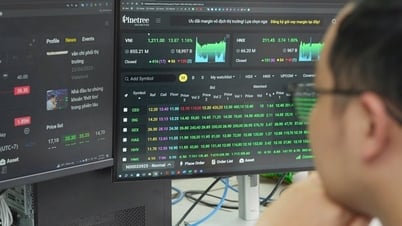Banks changing their headquarters is no longer a new story, but it has recently become popular again when Eximbank and LPBank mentioned it at the 2024 Extraordinary General Meeting of Shareholders.
LPBank's extraordinary general meeting of shareholders recently took place, and shareholders approved the Board of Directors' proposal to move the bank's headquarters. LPBank has yet to officially announce the location chosen for the new headquarters.
After LPBank, the Extraordinary General Meeting of Shareholders of Eximbank on November 28 will also discuss the story of moving the headquarters from Ho Chi Minh City to Hanoi to serve the goals of this bank in the new period.
According to financial and banking expert, Dr. Nguyen Tri Hieu, the decision of LPBank or Eximbank to move their headquarters may be related to the market expansion strategy as well as the customer base of each bank.
As the founder of First Vietnamese American Bank in the US, Dr. Nguyen Tri Hieu believes that, for whatever reason, the head office is the face of the bank. Therefore, choosing the location of the head office is considered a strategic issue for banks.
“With Eximbank, since its establishment, the bank has had its headquarters in Ho Chi Minh City, but now, they want to move to Hanoi, maybe because they have chosen a suitable location with good value,” said Dr. Nguyen Tri Hieu.
According to Mr. Hieu, many banks want to locate their headquarters in Hanoi because it is the economic, political and cultural center of the country. At the same time, it is close to central agencies, especially the headquarters of the State Bank.

Dr. Nguyen Tri Hieu emphasized that the above explanations are the common thoughts of banks when looking for a location for their headquarters. However, he believes that moving the headquarters will positively affect Eximbank's long-term strategy.
Speaking further about Eximbank’s internal conflicts, this expert emphasized: “Eximbank needs strong changes from the Board of Directors as well as the Executive Board. Changing the headquarters could be one of the impacts that will put Eximbank on the trajectory of stable, long-term development in the coming period.”
From the perspective of a banking legal expert, lawyer Truong Thanh Duc - Director of ANVI Law Firm said that decades ago, there were banks that moved their headquarters to other provinces and cities, even from North to South or vice versa.
Sharing the same opinion with Dr. Nguyen Tri Hieu, lawyer Truong Thanh Duc said: "Moving headquarters is to suit the market and customers that the bank wants to target, this is part of the long-term development strategy of the banks".
According to Mr. Duc, the relocation of headquarters depends on whether the decision of the General Meeting of Shareholders is approved by a majority or not. But in general, once it is presented to the General Meeting of Shareholders, it will almost certainly be approved because the bank owners are the ones who have the final say when they have a dominant influence.
Of course, the relocation of the bank's headquarters still has to wait for the decision of the management agency, the State Bank of Vietnam. However, the lawyer said that there is no reason for this agency to disagree when this does not affect the safety of the bank's operations, does not affect the quality of the bank's assets, and certainly does not affect the banking system and the market in general.
“Moving headquarters is the right of banks. The State Bank will only give its opinion when the bank is weak and needs to be controlled. At that time, the management agency will make recommendations on issues that need attention. In the case that the bank is operating normally, the State Bank has no reason to disagree,” emphasized lawyer Duc.
Mr. Duc cited the case of Maritime Bank (then Maritime Bank) which also decided to move its headquarters from Hai Phong city to Hanoi. However, at that time Maritime Bank was under special control (2001-2003), so the State Bank recommended to temporarily stop the relocation to focus on overcoming weaknesses.
In 2005, after being released from special control, Maritime Bank officially moved its headquarters to Hanoi, thereby expanding its customer base beyond the maritime industry and individual customers.
Source: https://vietnamnet.vn/ngan-hang-chuyen-tru-so-duoi-goc-nhin-chuyen-gia-2345371.html




![[Photo] General Secretary To Lam meets and expresses gratitude to Vietnam's Belarusian friends](https://vphoto.vietnam.vn/thumb/1200x675/vietnam/resource/IMAGE/2025/5/11/c515ee2054c54a87aa8a7cb520f2fa6e)
![[Photo] General Secretary To Lam arrives in Minsk, begins state visit to Belarus](https://vphoto.vietnam.vn/thumb/1200x675/vietnam/resource/IMAGE/2025/5/11/76602f587468437f8b5b7104495f444d)
![[Photo] General Secretary To Lam concludes visit to Russia, departs for Belarus](https://vphoto.vietnam.vn/thumb/1200x675/vietnam/resource/IMAGE/2025/5/11/0acf1081a95e4b1d9886c67fdafd95ed)




























![[Photo] National Assembly Chairman Tran Thanh Man attends the Party Congress of the Committee for Culture and Social Affairs](https://vphoto.vietnam.vn/thumb/1200x675/vietnam/resource/IMAGE/2025/5/11/f5ed02beb9404bca998a08b34ef255a6)




























































Comment (0)